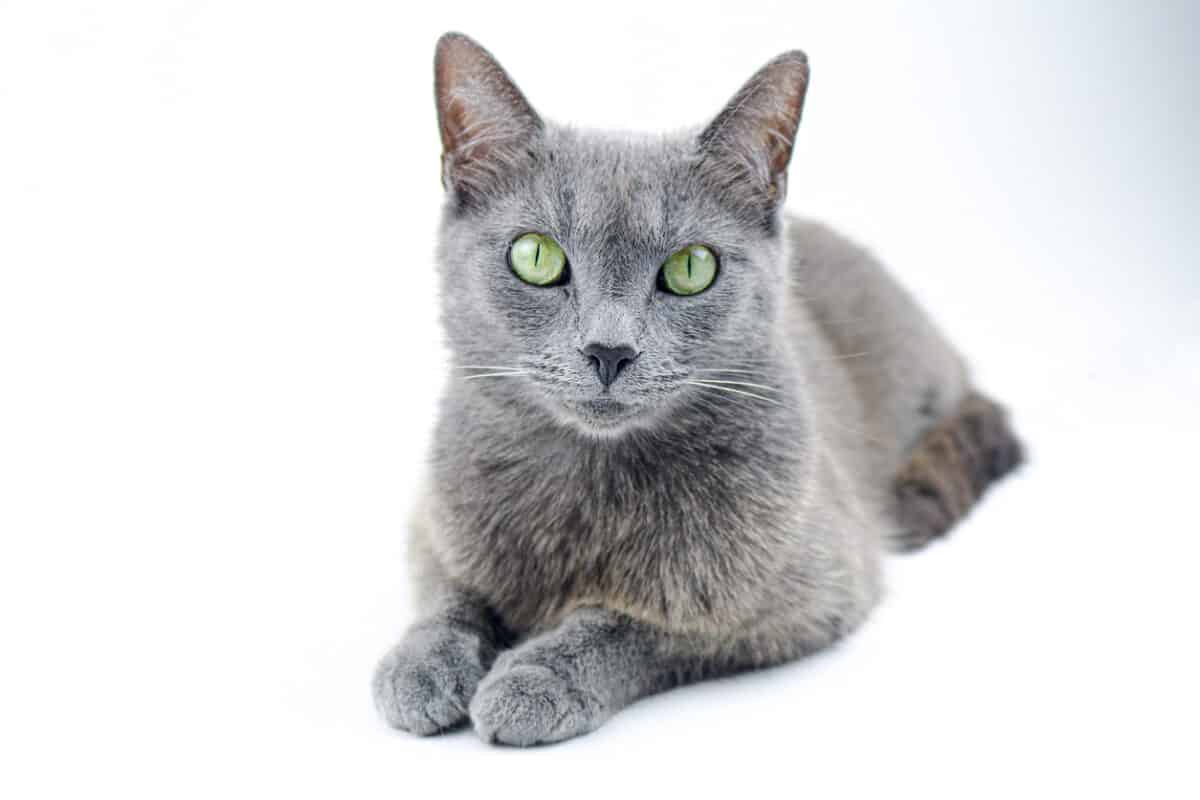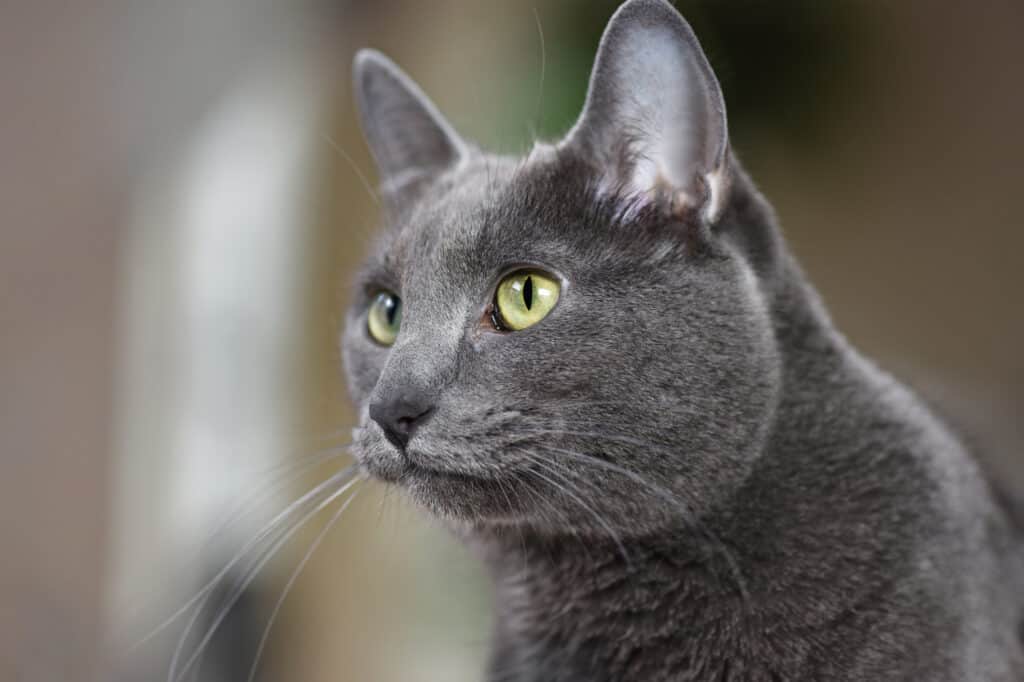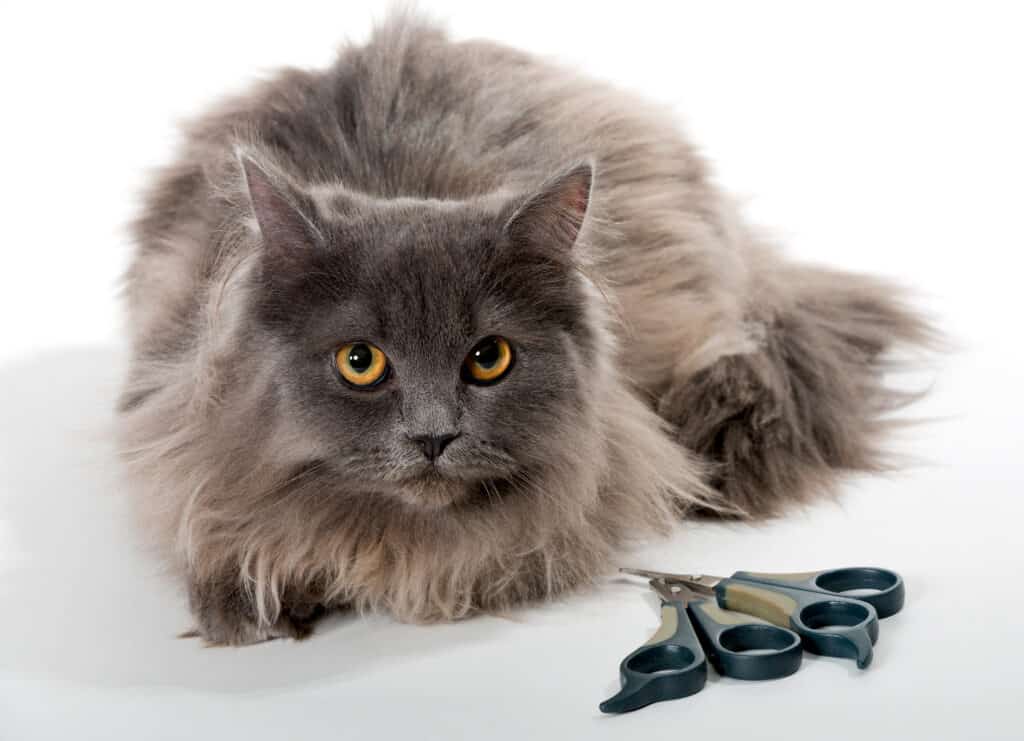Russian Blues are very sought after for pets due to their nature and their beauty. But what makes them so desired and how do you recognize a real Russian Blue cat?
Well, Russian Blues can be recognized by the following characteristics:
- Playful
- Intelligent
- Known to bond strongly with their owner
- Agile
- Eager to please
- Gentle
- Affectionate
- Not aggressive
- Calm
- Quiet
- Generally healthy
- Low maintenance
- “Hypoallergenic”
- Well behaved
Physical Characteristics
Russian Blues are striking cats due to their greyish silvery coat that has a blue tint to it. Sometimes they are considered steel blue. This makes them distinct and easy to recognize.
They have double coats, but the cats are also shorthaired. They don’t shed a lot, which makes them great for homes where too much pet hair can be a problem. They also do not produce as much of the protein FEL D 1, which is the usual trigger for feline allergies.
Their short fur means less brushing is required. Once a week should be enough to stay on top of the shedding and the hairballs.
Russian Blues are medium to large size cats, with average weights around 12 pounds and lengths of around 24 inches.
Russian Blues will also have beautiful and kind, large green eyes that are part of their trademark look.
Their facial shape makes them look like they are always smiling. Their legs are long and slender. And their leg-to-body ratio makes them look like very regal and majestic cats indeed.
General Health
Russian Blues have been bred to be very healthy, despite being purebreds. They do not have any specific genetic diseases that they are prone to, though they are just as susceptible to feline viruses and diseases as other cats.
One very important thing to watch out for is the weight of a Russian Blue. They are prone to overeating and can become obese without appropriate care and feeding.
This can be mitigated by feeding them twice a day on a regular schedule so their food can be measured and their intake can be monitored.
If you are training them with treats, you can cut back on the amount of regular food they get to offset their caloric intake. A Russian Blue should not weigh more than fifteen pounds.
Personality
These cats are known to be friendly and intelligent, but only with the people that they have bonded closely with. Typically, a Russian Blue will bond closely to one or two people, and be relatively ambivalent, though not mean to everyone else.
When a Russian Blue gets tired of a person or another animal, they will simply leave rather than fight back. This gives them the characteristic of being aloof.
However, this can be preferable in a lot of situations because it means they would rather run than fight, meaning they are not aggressive.
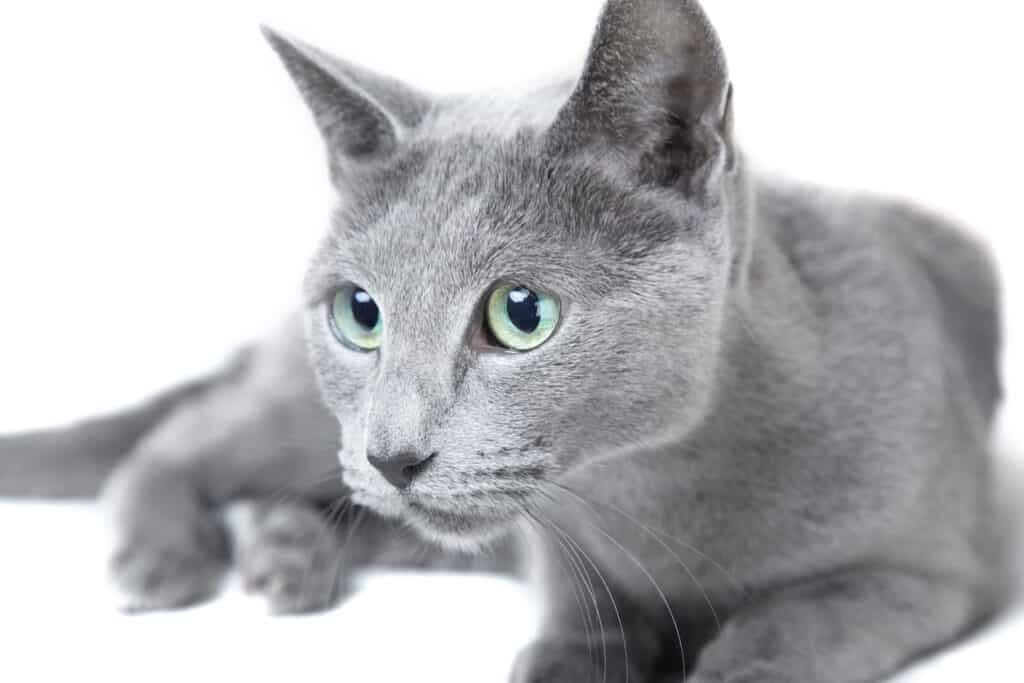
Ideal for families, good with kids
Russian Blues will get along well with older children and milder pets. They can absolutely be in a house with younger children and more rambunctious pets, but they will need their own space in this case and it might cause them a lot of stress if there is a very rowdy dog or another more aggressive cat.
These cats will tend to shy away from strangers. Too many new people and things will have them looking for their safe space. They’ll come out again when things have returned to normal, or the new thing is less new.
The introverts among cats
They are also quieter cats that do not have a high tendency to vocalize. This is good for families who need quiet, or for people who live in apartments with noise ordinances. That said, they can be encouraged to talk back with encouragement and positive reinforcement.
New Russian Blue owners should not be startled to find their quiet and mild cat staying away from them. Russian Blues often need time to be coaxed out of their shell. Patience and consistency are key.
However, once the Russian Blue has grown accustomed to the new surroundings, it will become very friendly and affectionate. It just takes time. You can encourage this bond with one-on-one time that includes playing, grooming, and pets.
Intelligence
Russian Blues are smart and can be trained to do simple tricks with adequate motivation and positive reinforcement. Because of their intelligence, they do need to be kept occupied more than other breeds of cats. This can be done by purchasing toys that challenge their thinking skills.
They will also appreciate toys that require interaction with their owner. This helps form that bond. Ideally, you should have a couple of ten-minute sessions throughout the day where the Russian Blue gets your undivided attention.
They can grow bored of toys, but toys can be rotated in and out of use every couple of months to re-spark interest with them.
Other Care
Russian Blues are very particular about litter boxes. Do not take this as an excuse to let them protest elsewhere.
The best thing you can do is clean their litter box once every day and replace the box with new litter once a week. It may also take some time to find a litter that your Russian Blue likes.
Russian Blues aren’t known for excessive scratching, but it is best to get a scratching post for them to stretch with and scratch on regardless. This will keep the amount of scratching the carpets and furniture down. It will also keep their nails worn down so you will not have to trim them.
Characteristics Overview
Physical Characteristics
| Weight | 8-15 pounds |
| Length | 15-18 inches |
| Height | 8-10 inches |
| Coat | Short, Double |
| Colors | Steel Blue |
| Eyes | Green |
| Lifespan | Up to 20 years |
| Hypoallergenic | Moderately |
| Shedding | Very little |
Personality
| Intelligence | High |
| Affection | Medium to High |
| Playfulness | Medium to High |
| Friendliness | Medium |
| Kid-friendly | Medium |
| Pet-friendly | Medium |
| Exercise needs | Medium |
| Vocalization tendencies (do they meow a lot) | Low |
Our Final Thoughts
Russian Blues are a great cat for families because they are gentle, kind, generally healthy, and long-lived. They are well-tolerated by people with allergies. They are not aggressive but can be encouraged to be cuddly. They are low maintenance and are considered to be an easy pet so long as you are willing to help them come out of their shell in the beginning.
Enjoy reading about cats?
Have a look at our other articles. Here are some of our most popular reads.
-
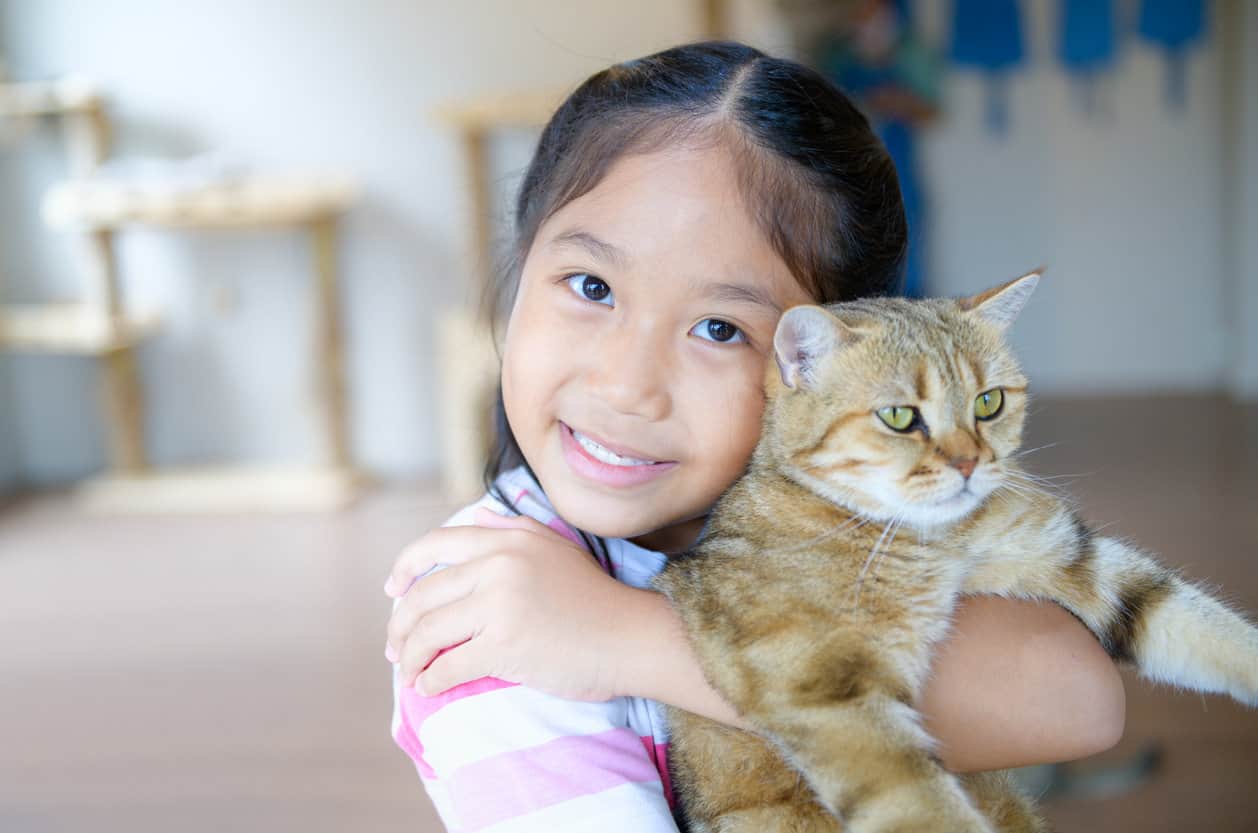
10 Ways to Make Your Cat Live Longer
The oldest cat to ever live passed away at the old age of 38. On average, household cats live between […]
-

12 Reasons Why Siamese Cats Cry at Night
Siamese cats are a popular breed of cats that many people choose to have as pets. Perhaps you have heard […]
-
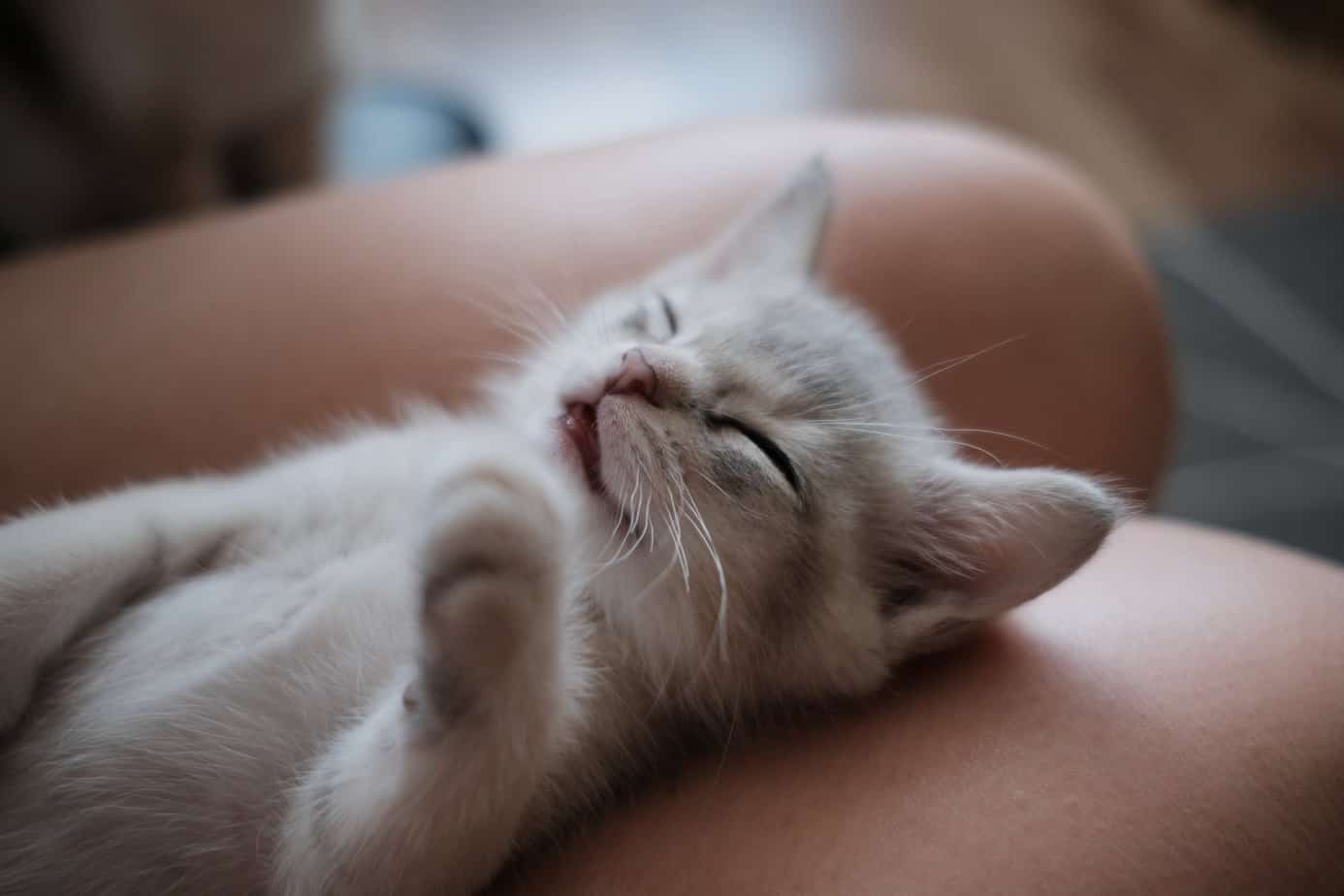
15 Incredible Ways That Cats Show Affection For Humans
Wondering how cats show their affection for humans? We have listed several incredible ways that cats are trying to show their love for us.

